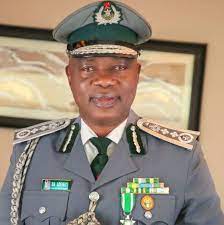Since 1999, Nigeria has added May 29 of every year to its long list of work-free days. The day is essential because it was on that day that Nigeria’s current democratic experience commenced.
Any attempt, therefore, to appraise the nation’s maritime sector since May 29, 1999 will invariably necessitate looking at issues like: port concession and associated issues, Customs reforms, maritime safety and security as well as Nigeria’s status within the comity of maritime nations.
Since 1999, Nigeria has added May 29 of every year to its long list of work-free days. The day is essential because it was on that day that Nigeria’s current democratic experience commenced.
Any attempt, therefore, to appraise the nation’s maritime sector since May 29, 1999 will invariably necessitate looking at issues like: port concession and associated issues, Customs reforms, maritime safety and security as well as Nigeria’s status within the comity of maritime nations.
The maritime industry arguably holds the unenviable records of being the only sector with the highest turn- over of ministers and chief executives of government agencies. Since 1999, the sector has had: Dr Mrs Kema Chikwe, Chief Ojo Maduekwe, Dr Abiye Sekibo, Alhaji Habib Aliyu, Prince Okechukwu Emeka, Alhaji Isa Bio, Alhaji Yusuf Suleiman and lately Senator Idris Umar. The same goes for both the Nigerian Ports Authourity and Nigerian Maritime Administration and Safety Agency and of course; the Nigeria Customs Service; all of which have had at least, five chief executives.
The greatest benefit of 13 years of democratic rule is port concession which has transformed the nation’s seaports into a saner and more profitable venture, unlike what obtained in the past when the port system was a haven for all manners of illegalities including: discharge of non-manifested cargoes, under payment of revenues that are due to the government, cargo vandalism and theft, uncontrolled human and vehicular traffic, and a host of other vices.
All that is gone, as the ports are now better and more profitably operated, even though with complaints from freight forwarders about high charges. But, port users will agree that port operations in 2012 is a lot better than that of pre-1999. Cargo throughput has soared; turn-around time for vessels has reduced, cargo dwell time has also improved, while ships of bigger draughts now call at our ports.
This is however not to say that there are no challenges in the ports any longer. But the challenges are basically operational and they predate the May 29, 1999 return to democratic rule.
The greatest failure of democratic dispensation is most visible in the prevailing state of the nation’s waterways and territorial waters where sea robbers and pirates have taken over; seizing ships and fishing trawlers, stealing cargoes and catches and sometimes maiming and killing crews on board the crafts. Piracy has put Nigeria on the world map of notoriety, next to lawless Somalia.
Even though, piracy and sea robbery abated at a point, its resurgence calls for concern. The recent maritime domain contract that was entered into between NIMASA and a private company is also not likely to reduce attacks on Nigerian waters and of her coast.
Suffice it to state here that the past 13 years of the new democratic experience are not without achievements. But, we will like to stress here that a lot more is wrong with the way democracy has turned the chief executives to absentee heads of the various agencies. They are hardly on ground to attend to issues as they unfold in their respective agencies. They are always in Abuja; either answering questions from their supervisory ministers or as guests of the various committees of both chambers of the National Assembly.
A lot of valuable man-hour is lost as the CEOs shuttle between the commercial capital city of Lagos and political capital, Abuja. The impact of their absence is better felt when serious operational and administrative issues are kept for their arrival.
That is why we acknowledge the comparison that some people have drawn between the military and democracy. Those who frown at the valuable time that is usually lost when CEOs answer the calls of the various committees at both the Senate and the House of Reps and their supervisory minister indeed have a point. The military has no time for the time – consuming ritual called ‘oversight functions’.
Certainly has brought freedom, enhanced port efficiency, made the agencies more people-friendly, it has also made stakeholders bolder to comment on issues and offer workable suggestions to the government.
Sadly also, it has led to paucity of funds for provision of essential structures and super structures that are required for a more responsive sector.
















Discussion about this post